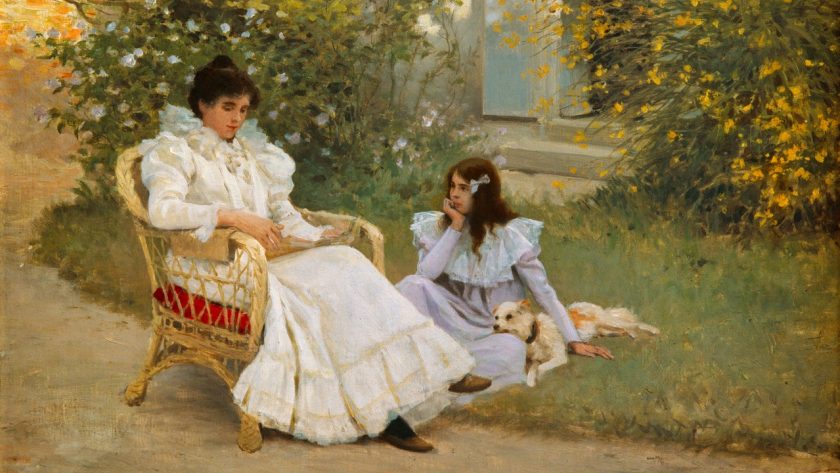Everyone has a period story. A recollection of when they first got it, of the particularly painful or heavy ones, and of the various embarrassing incidents around them. If you’re like me and came of age with YM Magazine, stories like this could usually be found (and ranked with four stars for ultimate humiliation) in the monthly “Say Anything” column. Because what could be more mortifying than public knowledge that you—gasp!—had your period?
For older generations, their period is something shrouded in secrecy and misinformation and shame. But there’s been a shift in recent years. Consider, as evidence, the arc of the period in popular culture. There’s Carrie in 1976 where the arrival of Sissy Spacek’s period is met by teenage girls flinging tampons and taunting “plug it up,” and then, more thrillingly, destructive powers. When they weren’t terrifying, periods have also been disappointingly portrayed as disgusting: see the bloody pants scene in 2007’s Superbad, or a certain former president’s comments about a news anchor bleeding out of her “I don’t know what” during a debate. Until the 1970s you couldn’t advertise anything related to periods on television and in the years after that menstrual products were always presented through a hazy lens (and without anything that resembled actual blood; remember all that blue liquid being poured on maxi pads to show off their absorbency?).
Fast forward to PEN15 and the life-size tampon episode or And Just Like That with Charlotte’s flash period or Turning Red, the 2022 Disney/Pixar movie that tackles puberty and periods (and has been viewed by myself and my five-year-old daughter roughly 32 times). But while there has been much progress in our collective period perception and the myriad products we now have to address them (a few favorites: Cora and DivaCup menstrual cups, The Period Company’s underwear, Perelel Cycle Support and Looni supplements) we are still also frustratingly stalled; just this year Florida introduced legislation dubbed the “Don’t Say Period” bill that would limit discussion of menstruation in schools.
All of which makes our periods a worthy subject for further exploration, something the new MSNBC Films documentary Periodical (this is only the second film that MSNBC has pushed to a theatrical release; it premieres in L.A. on October 10th), does brilliantly. The documentary, directed by Lina Plioplyte, covers everything from the evolution of period care products to period education and equity to, as Chris Bobel, an associate professor of Women’s, Gender & Sexuality Studies at the University of Massachusetts Boston and one of the film’s many insightful experts, says, the “women-shaped blindspots in medicine.” It’s entertaining and informative (even for those of us who’ve been menstruating for multiple decades now) and, ultimately, empowering; proof that knowledge does indeed give you agency. Here, director Lina Plioplyte shares how her path led her to periods.
Why did you focus on periods?
Because it’s something I’m not supposed to talk about and for me whenever I hear “not supposed to” I’m always like, “why?” In 2016 I started looking into periods and what I found was really interesting. Many of the world’s major religions said that periods were dirty, and you’re not supposed to cook or be close to men. Periods were approached as taboo and I was like, why is this a taboo? What’s so powerful about periods that they’re a taboo?
What did you discover when you started looking into periods?
There was, at a time, a budding period movement. There was Kiran Gandhi running the London Marathon free bleeding which made people lose their minds. And then there were a growing number of activists who believed that periods are not supposed to be a taboo because taboo stigmatizes it. And people who were working on getting supplies for those who are in underrepresented and underprivileged communities. I heard stories of Kenya and India and how many girls miss school there when they have their period…
Which happens here, too.
Exactly, the same stuff is happening here in the U.S.! One in five girls are missing school in the U.S. because of not having period supplies. And if you’re a woman who is in a lower income bracket and you have three teenage daughters, consider how much money that you have to dish out every month for products. It’s a lot!
Periods are political, which is a connection some people haven’t made yet. It becomes clear in the documentary—what changed for you as you started your research?
Once I started getting into period research I started tracking my own with the Clue app and switching from tampons, which I never was a big fan of, to the cup, and that really shifted things for me. I started applying what I was learning and really becoming curious about my own body. I was seeing, oh shit, I do have this PMS window when I am bitchy and sad and don’t come near me, but do get me coffee, but also leave me alone. When you really follow your cycle, you start seeing recurrences and that was an “aha” moment! I thought, OK, I’m not unpredictable to myself, I’m getting clearer to myself, and I have more control and agency over my own body.
You used the word “control” which really resonates with me. When I first started menstruating, I felt out of control. But now it’s all about biohacking your period and taking back that control…
Before we literally did not know! We didn’t have enough tools and data to actually know what was happening. And the cup of course changes the conversation because suddenly you can observe what’s coming out of your body and that changes your relationship with this strange liquid, like oh it’s browner today, or it’s watery, or there’s more of it. That turned me into a witchy-ass menstruator. And then you start reading online about all the wild things people do with menstrual blood, like that famous moment in our movie where a girl describes how it’s used in New Orleans love spells.
That was a moment. have you seen the conversation change in the time since you first started researching periods in 2016?
Yes, within that window I saw a bloody wave come in nationally, and worldwide too. We are speaking about menstruation much more broadly, much more freely, than we did in 2016 even. And by making this film about menstruation it helps further shake off that taboo. As Chris Bobel says in the film: “Once you shine a light onto a stigma, it can go away pretty quickly.” I’ve surely been steeping in the period soup for a while now, but I feel in general we are more flexible about it.
But there is still work to be done. Activists like Madeleine Morales and Anusha Singh point that out in the movie. What can people do?
Well since the premiere of our film at South by Southwest, Texas has taken down the Tampon Tax which we are so freaking proud about. It’s huge. Typically, the menstrual issues overlap with abortion issues. So, it’s very easy to know which states still have Tampon Tax because they are likely the states where abortion is something we don’t talk about. We are showing the film in Miami in October and that is massive because Florida is one of the states with a Tampon Tax.
And the activists working against the Tampon Tax in the film show that this is an issue that politicians are willing to cross the aisle for which is major.
We see it in the film and have seen it since the film that the menstruation issue is a bipartisan issue. Even Republicans are like, oh yeah, that’s unfair. This is everybody’s issue. The conversations are liberating but yes there is much more work to be done. Period Law is the place that somebody—everybody—should be looking at for what is being done. And Period.org is a movement that Anusha and the activists in the film are a part of. That’s a great place to look at for state-by-state comparisons and to see all the activism and activations happening. And believe me they are happening because these kids are fired up; they’re not going to stop until this is federally taken down and this is surely just the beginning.
Hopefully this is the beginning of more conversations around menstrual education in schools. I loved seeing the work of Chelsea VonChaz highlighted. Often there isn’t much information being doled out at home, nor at school.
First and foremost, we need to start calling people menstruators to be the most inclusive because as Madeleine pointedly says in the film, “mostly, but not exclusively, it’s women.” Nowadays menstruation is starting even earlier too, sometimes nine years old, which is never when regular sex education starts in the schools that do have it. Chelsea’s work is amazing and what she’s doing is a revolutionary act and while she’s expanding, we need Chelseas in all 50 states. I think that conversation is happening and we’re going to get there, but we can help nip the stigma by offering affirmation and factual information to these kids about their bodies.
There are so many amazing conversation starters in the film. Were there any moments that didn’t make it in?
Yes, the divine and glorious Gloria Steinem talking about how it’s not just women who are affected by the moon and the cycles. She was like, “the moon, the biggest body that moves waters of the earth, we are all affected by the moon: women, men, potatoes.” A reminder that we are all cyclical. Then there were also some femtech innovations that didn’t make it in because we decided to keep it brandless. But there are some insane inventions out there to help us menopause and menstruate easier and better.
If there’s a takeaway for viewers from the film, what do you hope that would be?
Our periods are a very simple process, but also such a big deal. I hope the film demystifies this miraculous, strange and mystical process that happens in our bodies. I feel very liberated after having made the film, so I really hope that it has that same effect on others too.



